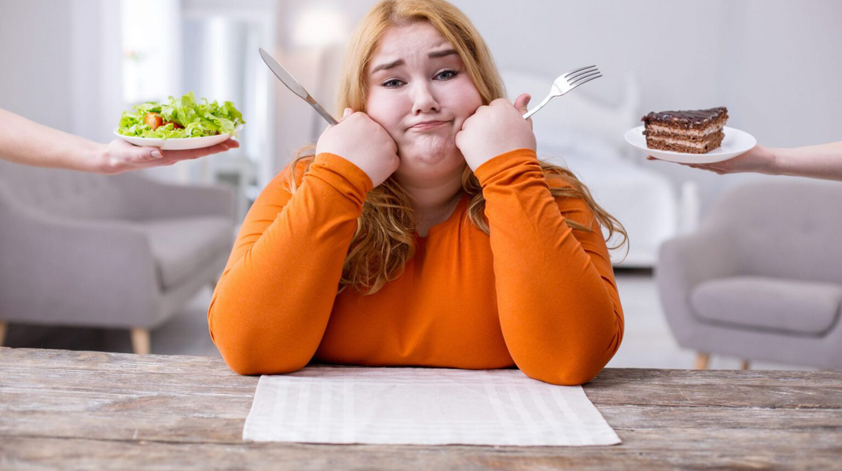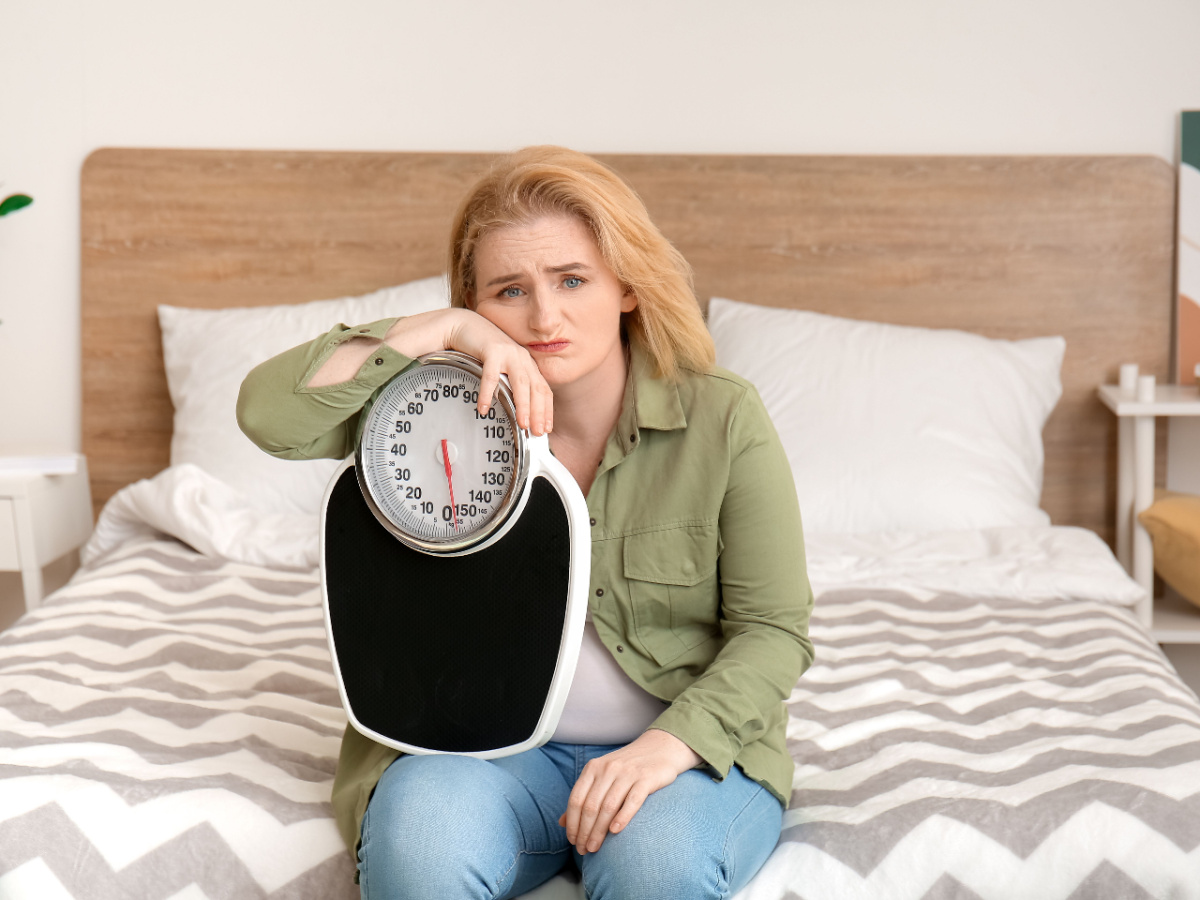Table of Contents
You had one too many drinks last Saturday evening because it’s the weekend anyway! At dinner last night, your dessert craving for chocolate cake turned out to be a binge – one tempting slice after another.
And today, you stuffed yourself with five buttery rolls at the office potluck. You originally intended to have only two of the tasty rolls, but they were just too yummy to ignore.
We’ve all been there, and we all know how those post-binge episodes go — from guilt to frustration to promising yourself that it’s going to be the last! (Not to mention the dreaded food coma…)
You thought you’d overcome overeating for good, yet it turns out that you’re back to square one when it comes to getting your cravings under control.
Why is it so hard to break out of this cycle?
Is there a way to kick this ceaseless habit and stop overeating for good?
Does it have to do with self-control and having an endless supply of willpower?
Or is there some otherworldly, mystical force that you need to tap into in order to break free from binge-eating episodes?
I’ll explain why it’s so tempting to finish a large box of pizza all by yourself, and I’ll help you understand how to stop overeating.
With obesity affecting more than one-third of the UK adult population, getting out of the binge-diet cycle remains a puzzle to many.
To have a greater understanding of how overeating happens, it makes sense to initially get a grasp of how our appetite, or the desire to eat, works.
What is overeating? – understanding how appetite works
It’s worth noting that appetite is a tad different from hunger. Think of hunger as a need to eat breakfast, while appetite is more like a desire to eat that sliver of cake after lunch.
At a fundamental level, hunger and appetite are influenced by a network of pathways involving the neuroendocrine system. Appetite regulation, satiety, and energy balance involve the following:
- Your gut (it’s the largest endocrine organ in the body!)
- A cocktail of hormones
- Your brain
In essence, energy-dense foods rich in fat and sugar were extremely desirable to our hunter-gatherer ancestors for survival because they were scarce. However, this instinct for fatty and sugary meals remains even though these types of food are now available 24/7.
Eventually, the continual intake of fat and sugar overrides the human body’s natural hunger regulation system, leading to habitual overeating.
In a nutshell, the more you gorge on food laced with too much fat and sugar, the more likely that you’re going to get addicted to it.
Also Read: 6 Reasons To Lose 3 Stone
Homeostatic and hedonic hunger
Another way of understanding appetite is to look at it from the perspective of eating for two main reasons— as a response to hunger (homeostatic) and for pleasure (hedonic).
In a review of studies differentiating the two, the researchers described that homeostatic hunger is the result of the prolonged absence of energy intake or food itself, while hedonic hunger is strongly influenced by the availability and palatability of food in your environment.
Why you really overeat and binge – what influences an eating disorder
At first thought, it seems like putting an end to overeating is simply a matter of telling your brain to stop consuming food. Yet we all know that it’s not that easy, right?
Your brain may be the main driving force behind your appetite, but it’s not acting alone.
The frequency and the amount of food you eat is also influenced by a complex interaction of the following factors:
1. Genetic influences
Your gut, hormones, and brain may be working together to control appetite, but your genetic makeup also has a say as if you’re the type to overindulge. Sadly, there isn’t a whole lot you can do about your genes, but they are only one of three factors that influence your appetite.
Also Read: Why You Need To Know Your Body Fat Percentage
2. Environmental influences
Environmental factors also contribute to the rise of appetite. These factors include the atmosphere of the room and the presence/absence of distractions during meals.
Child feeding practices by parents during the first years of childhood tend to impact one’s eating behaviour later in life. A review of studies on the parental influence on eating behaviour revealed the following interesting findings:
- Restrictive feeding practices by caregivers are associated with overeating and poorer self-regulation of food intake among preschool-age children.
- Restricting access to palatable foods like cookies in children may be counterproductive because it will eventually promote their intake.
- Higher levels of parental control and pressure to eat were associated with lower fruit and vegetable intakes and higher intake of dietary fat among young girls.
3. Psychological influences
Psychological influences are the third and final factor that influences overeating. There are many psychological reasons for overeating, which can arguably be the most difficult to overcome. Stress, negative experiences, and even social pressures can lead to forming an eating disorder. This unhealthy relationship with food can make people eat more than they should, and potentially even develop into a binge eating disorder. While this might make it easier to cope with short-term problems, eating too much food is not good for your health, and can cause a range of health issues, such as heart problems or cancer risks, down the line. The following are a few noteworthy facts about psychological influences on overeating:
- Did you know that not sleeping enough or getting stressed over finals week could lead to you reaching out for the cookie jar five times a day when you’re not actually hungry?
- It turns out that your appetite and hunger regulation is also influenced by these behavioural factors.
- In fact, evidence from longitudinal studies suggests that chronic life stress may be linked to weight gain, with a greater effect seen in men.
Whether it’s stress or social pressure that’s driving you to overeat, we all know how frustrating it is to realize that you gave in to your cravings (again!). The good news is you can do something the next time you’re about to open your third bag of crisps.
Also Read: Understanding Emotional Eating
How to stop overeating – what should I do?
For a start, consider the following easy yet sustainable solutions for how to stop overeating, minus the horrible feeling of self-deprivation. Learn to recognize the difference between homeostatic and hedonistic hunger.
As mentioned earlier, you can eat because you’re hungry, but you can also eat for pleasure.
It can be a struggle to figure out the difference between the two because it requires you to be more mindful of your body. As a result, misinterpreting hunger and satiety signals can lead to overeating.
It can be challenging to recognize the true signs of hunger and satiety. While these cues will differ from one person to another (as well as depend on the time of day), you can learn to recognize your motivation for eating and adjust your eating habits by asking the following question:
Am I eating as a response to a physical cue (e.g. growling stomach, headache), or am I eating because I am feeling stressed, anxious, or overjoyed?
Whether you’re stressed about deadlines or fed up with your annual employee performance review, talking to a friend or journaling may be more helpful than eating your emotions away.
Be mindful of your “food environment”. Your “food environment” may be divided into two parts:
- Your social interaction and the overall atmosphere of your environment
- How your food is served
To help promote a positive food environment, consider the following best practices:
- Keep an eye on your portions.
- Before eating two chocolate bars in one sitting, savour one instead. Furthermore, you might also want to use smaller plates and bowls to avoid taking in too much when you’re in a buffet. Press pause (whether on your TV or phone) until you’re done with lunch or dinner. When you’re distracted, you tend to eat mindlessly. As a result, you’ll be less sensitive to satiety cues because your brain is paying more attention to other things.
- Eat slowly. According to the research conducted in a Greek study, eating at a slower pace tended to increase fullness and reduce hunger ratings in overweight and obese participants.
- Surround yourself with people who are taking steps to eat more mindfully. Whether it’s your co-worker who’s into calorie counting or your brother who’s a geek when it comes to meal planning, being around others who eat mindfully will help reinforce your own good habits and perhaps teach you some new tips and tricks as well.
- Make tiny adjustments to your daily habits that may impact your eating behaviour. Curbing overeating is not about making massive changes in your life but rather making tiny adjustments to your daily habits.
These are a few examples of tiny adjustments you can make to your daily habits.
- Stop skimping on sleep, pronto. As mentioned earlier, lack of sleep can lead to eating more. Are you struggling to get a good night’s sleep? Establishing a consistent bedtime routine may be a good start. An irregular bedtime schedule is linked to poor sleep quality.
- Eat breakfast when you can. There may be some exceptions (like when you’re doing intermittent fasting), but skipping your morning meal usually leads to overeating because you end up feeling famished throughout the day. On the other hand, protein-rich breakfasts are associated with increased satiety and reduced hunger cues.
- Do whole food swaps instead of cutting out certain foods entirely.
- You don’t have to toss all the junk food residing in your fridge right away. A good rule of thumb is to have at least 80 percent of your daily meals from whole food sources and devote the rest to the not-so-healthy food items. By doing so, you won’t feel deprived, which in turn can lead to another binging episode.
How to stop overeating at night
Overeating isn’t only something that can happen during the day. Cravings can rear their heads at any point, whether it be to quell the boredom of a lazy Sunday, a quick snack before bed, or in the evening of a particularly stressful workday. If you’re truly going to avoid overeating, you need to keep up your awareness during the evenings, too. It isn’t all down to pure willpower, however. Think of what you do during the day as a foundation for avoiding overeating at night, with the first brick in that foundation being nutrition.
Nutrition is an incredibly important part of avoiding eating food at night. If you fail to adequately provide your body with the nutrition it needs during the day, it’ll have strong words for you in the evening. At this point, it’s easy to give in and have a few snacks, especially if you’ve had a rough day. So, if nutrition is important, what exactly should you be eating during the day?
The answer is more or less what you’d expect. Cutting out processed foods from your diet and replacing them with healthy foods rich in nutrition is a great place to start. Foods high in protein are a good call, which means adding poultry, beef, and other lean meats to your diet. Foods that have protein and other nutrition are also good choices, such as dairy products and nuts. Including vegetables, specifically greens, is another surefire way of improving the nutrition in your diet. Some people that have successfully defeated their urges to overeat claim that having a dinner that is high in protein helped them stave off their nighttime cravings, though your mileage may vary. For specifics, it’s always good to ask an expert in diet and nutrition.
In addition to nutrition and a good diet, when you eat will influence how strong your cravings will be at night. According to research published in the journal Obesity, your own body clock will influence when you feel hungry, and when you’ll crave unhealthy foods. More specifically, those that feel less hungry in the morning, and, therefore, often skip breakfast, report feeling the most hungry in the evening. The cure to this is simple – don’t skip breakfast. Try to add the aforementioned foods, like protein-rich meats and dairy products, to your breakfast and possibly even eat dinner at a later time. Both strategies should help you set up a more healthy eating routine, making you much less likely to binge at night.
Food addiction
A lot of people can relate to overeating (because it happens to the best of us, too!), but food addiction is a different story. If you feel that your binging episodes have turned into more than just a bad habit that you can change, seek professional help.
Frequently asked questions
Overeating, and how to reduce overeating, is a very broad topic. Understandably, there are a lot of questions surrounding the topic, too. We’ve put together a few of the most commonly asked questions to provide a series of answers in one go.
How can I train myself to eat less?
There isn’t any one way to train yourself to eat less. This isn’t necessarily a bad thing; you’ll be able to try a bunch of different approaches and settle on the ones that work for you. For example, if you regularly eat in front of the TV, consider pausing your programme and eating slowly, making sure to savour your food. Cutting out distractions can help you be aware of how much you’re eating, both consciously and subconsciously.
If you regularly eat food without cutlery, consider having your next meal with some. This can help you eat slower, which in turn helps you eat less. Alternatively, you could drink a couple of cups of water a little while before your meal. This will make you feel a bit more full before you even start eating, which should help you reduce the amount of food you eat. If none of these work for you, there are a load of other tips online that you could try.
Why can’t I stop eating when I’m full?
Continuing to eat when you’re full might sound counterintuitive at first, and you might well be thinking you’re out of the norm if this happens to you. While it certainly can be an unhealthy habit, the urge to continue eating has its roots in our distant past. When food wasn’t as readily available as it is now, a reliable survival strategy was to fill up on anything and everything, regardless of hunger. Though it might have been good for our ancestors, in our modern age, it does far more harm than good.
Fixing this problem relies on pacing yourself. Eating when full is a problem that some people have shortly after a serious diet. This is essentially the body’s response to the “feast” part of feast or famine; depriving the body of food during a serious diet can be a shock to some, leading to their body demanding a much higher food intake at the end of the diet, leading them right back to square one. Making sure you don’t go too fast in both eating and dieting can help fix this.
What are symptoms of overeating?
Overeating can cause a whole host of negative symptoms. These include:
- Bloating
- Heartburn
- Tiredness
- Insomnia
- Nausea
- Acid reflux
While not an exhaustive list, the above are some of the more common symptoms of overeating, and it’s best for your health to cut down on unnecessary food consumption. Overeating can also lead to more severe health issues later in life, and has even been linked to certain types of cancer.








